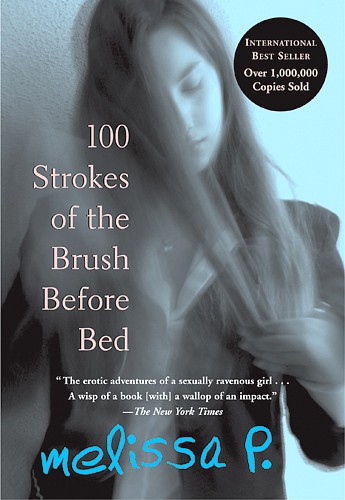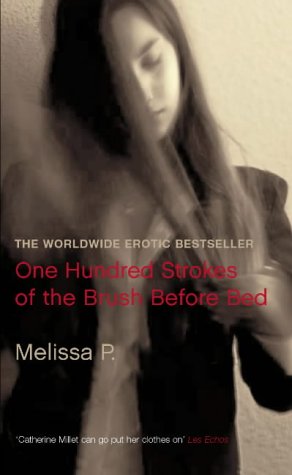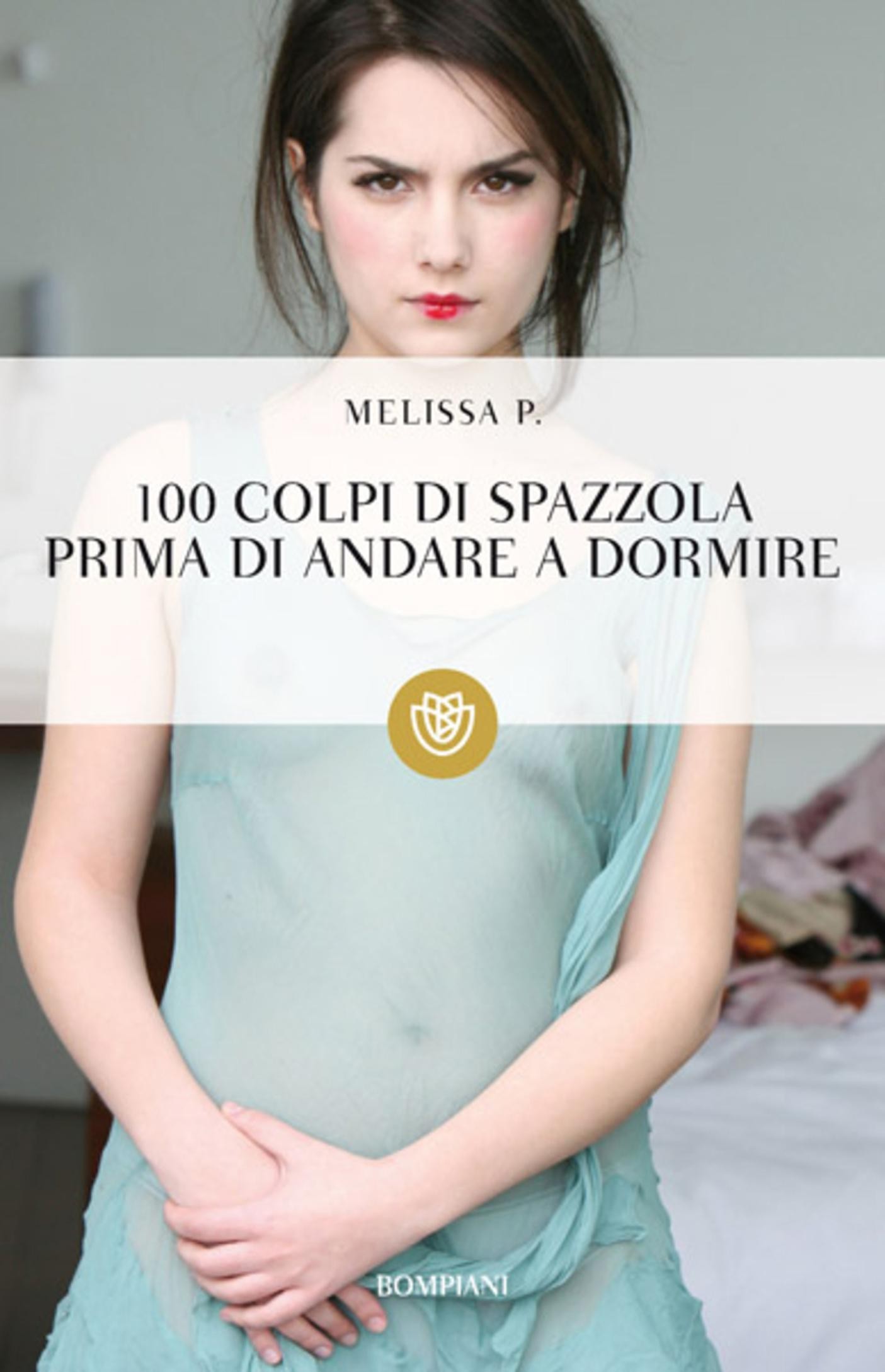 If you consider the tale of a teenage girl fucking a married man in the ass with a vinyl dildo a raunchy one, then Melissa Panarello, author of 100 Strokes of the Brush Before Bed (translated from Italian by Lawrence Venuti), has written a veritably raunchy book. The facts that it’s an “autobiographical novel” and the Italian author is barely eighteen have elevated 100 Strokes to an international scandal and commercial success: more than 700,000 copies have been sold in Italy alone. Her critics take personal affront at Panarello’s raw discussions of underage sexuality — blindfolded group sex, simulated rape — while her advocates (like, um, this month’s Teen Vogue) praise her courage and honesty.
If you consider the tale of a teenage girl fucking a married man in the ass with a vinyl dildo a raunchy one, then Melissa Panarello, author of 100 Strokes of the Brush Before Bed (translated from Italian by Lawrence Venuti), has written a veritably raunchy book. The facts that it’s an “autobiographical novel” and the Italian author is barely eighteen have elevated 100 Strokes to an international scandal and commercial success: more than 700,000 copies have been sold in Italy alone. Her critics take personal affront at Panarello’s raw discussions of underage sexuality — blindfolded group sex, simulated rape — while her advocates (like, um, this month’s Teen Vogue) praise her courage and honesty.
Nerve recently spoke with the book world’s “it” girl of iniquity and found out that she’s as un-interested in being the courageous, honest Voice of a Generation as she is in being the next European Wurtzel or Fielding — young, erudite, emotionally diseased and proud of it. In fact, Panarello was more poised than prurient, not exactly the girl in heat she shamelessly describes in her work. — Carrie Hill Wilner
***
Is your age more controversial than your material? Obviously. Erotic books come out all the time, but not that many cause controversy or sell a lot of copies. At least in my opinion, the material in itself isn’t really scandalous, and I think the scandal in other people’s opinion is that this is coming from a young girl. It’s an autobiographical novel written in the form of the diary of Melissa P., my alter ego, recounting this series of sort of degrading sexual experiences she has through the age of sixteen. And well, teenagers having and talking about extreme sexual experiences will always cause controversy.
Do you think there’s a valid distinction between “erotic literature” and literature proper, and do you consider yourself a writer of erotica? I understand the distinction, and I enjoy reading what I consider erotic literature, but I don’t particularly relate to what it represents. I’d describe my book as about growing up in a dangerous world.
Should Melissa’s behavior shock and upset people, or is it within the normal range? It’s definitely not normal. But I consider the most scandalous thing the fact that the book is [considered] scandalous. It bespeaks a real sort of close-mindedness that this sort of discussion is still considered out of line.
What about the critics who use this as an excuse to lament the general downfall of Modern Youth? Do you think there are elements of Melissa’s experience that reflect a more widespread sexual reality? I find the suggestion that I’d speak for a whole generation pretty ridiculous. In the same way you can’t suggest there’s one book that speaks for the whole adult world, you can’t say a book speaks to or reflects the adolescent experience. That certainly wasn’t my intention.
Every mildly scandalous artifact of youth culture is held up as an example of how we’re all going to hell. Why do you think people are so eager to find these messages and generalizations? I don’t know, it can be partially explained as arrogance, and as people diagnosing others as degenerates so that they can feel good about themselves. And no one ever thinks carefully about what’s going on in the larger world that precipitates this behavior they find so shocking. No one makes an effort to understand who we are and why we do what we do, only to criticize those actions.
Maybe they’re just jealous. I could see that. I don’t know, it seems so many people just don’t have the tools to relate to young people, I don’t know why, and that seems very scary to them. Jealousy, yes, but also incompetence.
Ideally, how would your book be received? For one, people would look more at the book itself, instead of this fixation with everything around it.
One thing that’s unavoidable but sort of annoying when you write about your own sexuality is that there will be a subset of readers who will use your writing as pornography — what are your feelings about that? I don’t know, seeing as I often read erotic comics or erotic books simply to be turned on. I’ve never really thought of that response as anything but human nature.
Reading 100 Strokes can be both very jarring and a turn-on — were there parts that were upsetting or arousing for you to write? Not really. There weren’t many emotions involved in the moment [I was writing]. I was more trying to understand.
Was it entirely based on your own experience? A lot is real, some is fantasy, but I consider it autobiographical because it’s very much where I was at that time. In that sense, it’s a faithful account.
Why did you decide on a diary format? My publisher and I spoke about doing a regular novel, but it didn’t really work, there’s not much plot.
Despite the risqué content and non-traditional structure of the book, it follows a traditional narrative in terms of the bad girl meets good boy and is saved by love storyline. Why rely on that? I was encouraged to make the ending darker, but in the end I really consider the narrative a sort of a fairy tale, and I think it works.
There’s a scene in the book where Melissa’s mother uses a fairy tale to help Melissa learn from her experiences. Do you think that moral lesson is at the center of 100 Strokes as well, or is it just an aspect of Melissa’s experience? I definitely think the lesson of that fable is relevant to the book, and to my experience. It’s not incidental.
How did people around you react to the book? My parents weren’t thrilled. They didn’t want me to publish it at first, though they’ve come to understand its importance and necessity to me. My friends quite liked it; I’d read them passages for editing as I was writing. My professors reacted poorly, but I left school, so that doesn’t really matter.
Do you get a lot of creepy fan mail? Strangely enough, considering the success of the book, I haven’t gotten much of that. I got some strange email from one couple, but it’s really more degrading to them than it is to myself. The few times it’s happened, I’ve just laughed it off.
You were talking earlier about your own experience with erotic literature, can you tell me about the first pieces you found particularly interesting, or that influenced your writing? Well, it wasn’t really an everyone’s-doing-it-so-I-can-too that prompted me to write this. I probably would have done it had I not been exposed to any erotic literature. I can’t think of anything specific that opened up my mind.
Still, writing something like this requires quite a bit of courage. Where do you think you get those resources from? It’s flattering that you say that but I never relied on any big swell of courage, it was a pretty normal process for me, and I didn’t really anticipate the reaction, one way or the other. It was just a part of my daily life, it was pretty easy. Courage doesn’t have that much to do with writing.
Italy’s had a pretty strong tradition of very young writers over the past few decades; there’s no real parallel in the States. Do you see yourself in this tradition? I prefer to think in global terms, and in that sense, I do see myself as part of a general tendency. There are a lot of very young people writing about what they know in a very autobiographical manner, a lot of young Japanese writers, then you have JT Leroy, for example. I think we’re really witnessing a new movement that’s global. That’s the level at which these things are happening, and that’s the context I see myself in, more than a national context.
Where do you think that energy is coming from, that this is happening right now? I don’t know, probably now more than ever, we’re totally alienated from our surroundings, or rather, there’s this world we don’t want to belong to, and so people are examining themselves. It’s a crisis we’re all living right now.




